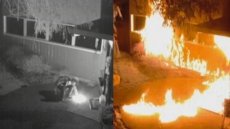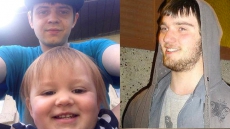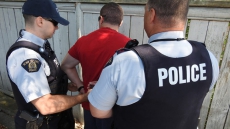WINNIPEG — A dog has severe burns over its body after being thrown into a firepit in a community in northern Manitoba.
Katie Powell, president and founder of Save a Dog Network Canada, says two kids between 10 and 12 years old took a family's dog off a porch on Sunday and tossed him into a firepit on the Red Sucker Lake First Nation.
"Polo ended up coming home about a half hour later. His whole body was smoking ... (and) he had smoke and bubbles coming from his nose," Powell said Wednesday.
"It was pretty horrific and obviously devastating for the family and the children that own this animal."
The family called Save a Dog because the group had vaccinated the pup and about 60 others in the community last summer. Powell's group was able to get Polo, a lab mix, on the next flight out to Winnipeg, about 600 kilometres to the south.
Polo's thick fur actually saved him, Powell said.
"If he didn't have such a thick coat he would have for sure died. The areas that are badly burned are those that aren't covered by fur: his belly, his thighs, his testicles, his neck, face. His nose is pretty badly burned."
Polo, who is about eight months old, is being cared for at a veterinary clinic in Winnipeg, but it's hoped he will get the all-clear to go to a foster home in the next few days. Once he's well, he will be sent to a rescue group in Vancouver, where he will be put up for adoption.
"The family wants a better life for him and clearly there's some issues going on in this community, so they asked us to find him a good home," Powell said.
She said it's believed one of the children in the family was being bullied and the dog was targeted.
"The children are devastated. The family is at a loss for words. I don't think anyone can prepare for such a heinous act, let alone to your animal.
"They're really thankful that we were able to support this family and I think the whole community is shook up over this."
Save A Dog has been working to build relationships with isolated First Nations communities that don't have access to veterinary care. The goal is to provide education and resources, Powell said.
"These people don't have running water. They don't have garbage collection. They don't have paved roads and they don't have access to proper veterinarian care. For them to trust us with their loved dog, it just shows they want change in their community and they're eager to accept our help.
"Our focus is to provide non-judgmental love and support, and try to empower them to self-regulate."



